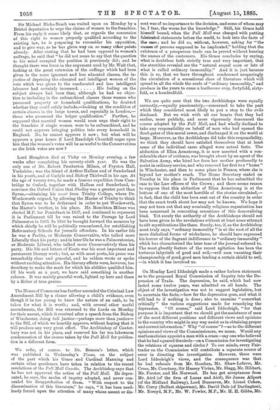Lord Houghton died at Vichy on Monday evening, a few
weeks after completing his seventy-sixth year. He was the
only son of Mr. Robert Pemberton Milnes, of Fryston Hall, Yorkshire ; was the friend of Arthur Hallam and of Sunderland in his youth, and of Carlyle and Bishop Thiriwall in his age. At the age of twenty-two, he made a famous expedition from Cam- bridge to Oxford, together with Hallam and Sunderland, to convince the Oxford Union that Shelley was a greater poet than Byron,—obtaining his exeat from Trinity College, where Dr. Wordsworth reigned, by allowing the Master of Trinity to think that Byron was to be dethroned in order to put Wordsworth, the Master's brother, in his place. Mr. Monckton Milnes was elected M.P. for Pontefract in 1837, and continued to represent it in Parliament till he was raised to the Peerage by Lord Palmerston in 1863. In 1846 he brought forward the measure by which chiefly he will be politically remembered, for establishing Reformatory Schools for juvenile offenders. In his earlier life he was a Peelite, or Moderate Conservative, who talked more Liberally than his party; and in later life he was a Palmerstonian, or Moderate Liberal, who talked more Conservatively than his party. His life and letters of Keats was his most important and permanent literary work; but, as with most poets, his prose was remarkably clear and graceful, and he seldom wrote or spoke without exciting attention. His literary efforts were, however, too desultory to make the mark for which his abilities qualified him. Of his work as a poet, we have said something in another column. It was mainly graceful work, lighted up here and there by a flicker of true genius.


































 Previous page
Previous page